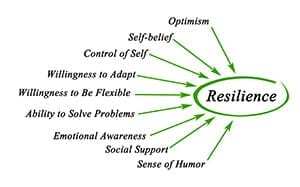Over the last 12 years, I have had the opportunity to work with several college students who found themselves overwhelmed with anxiety and stress to the point that they had to leave school.
Going home didn’t resolve their anxiety and depression. In many  cases, these students reported their initial issues only became worse and even compounded. Once home, they began to deal with guilt and embarrassment as well as not having certainty on how to proceed forward in their life. Then, the unrelenting whirlwind of thoughts and feelings only worsen anxiety and depression.
cases, these students reported their initial issues only became worse and even compounded. Once home, they began to deal with guilt and embarrassment as well as not having certainty on how to proceed forward in their life. Then, the unrelenting whirlwind of thoughts and feelings only worsen anxiety and depression.
Working together, and they were able to bounce back and go back to complete their degrees. In this individualized program, I can help students with the various issues that affect college students today, including the social and interpersonal aspects many young adults face.
More than Academics
All the college students I have worked with possessed an excellent academic background. They all had worked hard through high school and prepared well for college. As a result, many had been admitted into some of the most elite colleges and universities. However, they were now unable to continue and were debilitated by anxiety and depression.
So, it was not their lack of academic rigor or preparation that  caused them to return home, it was something else. In most cases, there is no single reason why anyone will face these kind of challenges, and it is only after entering college that anything surfaces. However today, there are a series of validated procedures that can be used to help just about anyone get out of these cycles and be able to bounce back.
caused them to return home, it was something else. In most cases, there is no single reason why anyone will face these kind of challenges, and it is only after entering college that anything surfaces. However today, there are a series of validated procedures that can be used to help just about anyone get out of these cycles and be able to bounce back.
Why my background may help
My clinical knowledge centers around the specialization in treating severe and complex anxiety, depression, and trauma. My training allowed me to work with extreme cases such as the problems experienced by returning war veterans and even survivors of torture. Thus, over the years, I worked with a vast amount of people dealing with severe anxiety and depression in a variety of circumstances.
 Aside from my clinical background, I can also relate to the demands you may be dealing with as an undergraduate or graduate student. The reason is because, for several years, I have had the privilege of teaching both undergraduate and graduate students at some of the local colleges and universities. Also, during my ten years working at the county hospital, I supervise the clinical performance of graduate-level psychology interns and lectured medical residents.
Aside from my clinical background, I can also relate to the demands you may be dealing with as an undergraduate or graduate student. The reason is because, for several years, I have had the privilege of teaching both undergraduate and graduate students at some of the local colleges and universities. Also, during my ten years working at the county hospital, I supervise the clinical performance of graduate-level psychology interns and lectured medical residents.
As a professor, I witnessed first hand the strain and challenges my students were facing. After all, every year, the amount of material that is covered and taught continues to increase by volumes. Also, it is not uncommon to see the demands of one class conflict with the requirements of another, thereby increasing the stress level of everything.
Next, there is the underlying need to perform at a competitively high level. Those test scores and the resulting GPA will affect many future opportunities, including what graduate schools are available to the student and what internships and employment placements they can apply for.
 Of course, there is also the financial aspect of education which has soared to levels never seen before, and nobody wants to waste additional monies. When we look at all that is being thrown at the typical college student it is easy to see why the mental health centers in all college and universities are over burden.
Of course, there is also the financial aspect of education which has soared to levels never seen before, and nobody wants to waste additional monies. When we look at all that is being thrown at the typical college student it is easy to see why the mental health centers in all college and universities are over burden.
The sad fact is that there is nothing that can be done to reduce or eliminate the stress associated with the college experience. What we can do is learn to work around it and through it so that we can achieve what we want despite it.
The good news is that there are a lot of practical, scientifically validated strategies and techniques that can be used to help just about anyone manage their anxiety and depression. And, there are now an equally amount of empirical models that we can all learn that will build our resilience regardless of the demands and challenges of college.
Years ago I researched the area of resilience throughout the medical and psychological journals and discovered that there were many empirically proven strategies and techniques that were being effectively utilized by many top-performing organizations. The research showed how organizations such as our elite military units, the US Olympic team, NFL, NBA, and fortune 500 businesses were utilizing this proven knowledge.
 The research showed that not only was it possible for individuals to develop a resilient mind against external stress, they could also be able to reach new heights of performance in any of their endeavors. In other words, these skills will not only help you succeed in graduating college, but they are also transferable to all other aspects of your life where stress and performance exist. Individuals who master the proper mindset are then able to be extremely productive in the workplace.
The research showed that not only was it possible for individuals to develop a resilient mind against external stress, they could also be able to reach new heights of performance in any of their endeavors. In other words, these skills will not only help you succeed in graduating college, but they are also transferable to all other aspects of your life where stress and performance exist. Individuals who master the proper mindset are then able to be extremely productive in the workplace.
These findings interested me a lot because my students needed not only to be able to deal effectively with stress; they also needed to be able to perform well under the strain of stress, graduate, and move on with their chosen careers.
The Bounce Back Program
This program is composed of two parts. This first part is to address, stabilize, and treat the anxiety and depression the student is experiencing.  The actual treatment approach will be based solely on the needs and circumstances of the individual. We will use various protocols, including cognitive behavioral therapy, as well as coordinate the treatment with other medical providers as needed.
The actual treatment approach will be based solely on the needs and circumstances of the individual. We will use various protocols, including cognitive behavioral therapy, as well as coordinate the treatment with other medical providers as needed.
The second part of the program involves integrating the various strategies and techniques that will build up the student’s resilience. The specific style and processes we will use will depend on the student’s goals and objectives. I work with the student to help them sort through what they want so that they have clarity. During the weekly sessions, the student will learn and practice the techniques. There will also be brief assignments to complete in between sessions to help hone and refine the process.
It is not a magic bullet
Learning and developing the necessary skills to be resilient and incorporating the various components of this program is doable by  just about anyone.
just about anyone.
Committing to practicing and making it your own is the tough part.
Just like physical training, it can’t be mastered by watching or listening; you have to practice. This program walks you through each of the steps and helps you develop the resilient mindset. Individuals find introspection and direction, which helps them develop clarity and set achievable goals. You will find your “why.” The program will identify your specific stumbling areas and give you options on how to overcome them going forward. The skills you develop through this program will carry into your career and future.
The first participants
 Those first students that I worked with and developed the program around have all now graduated moving forward with their lives. Some have successfully entered the workforce and continued to grow in their chosen careers. Others decided to continue with their education and are now half way through graduate school. From time to time, I hear from them, and they share how what they learned going through my program continues to pay off.
Those first students that I worked with and developed the program around have all now graduated moving forward with their lives. Some have successfully entered the workforce and continued to grow in their chosen careers. Others decided to continue with their education and are now half way through graduate school. From time to time, I hear from them, and they share how what they learned going through my program continues to pay off.
Your Next Step
You are cordially invited to call our office and discuss your situation. You don’t have to deal with anxiety and depression alone, there are solutions that will make you feel better and allow you to perform at your true potential. Call today and allow us to help you get back to where you want to be.

